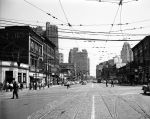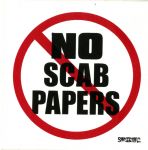Blogs
Philip P. Mason Oral History Now Available Online
What we now know as the Walter P. Reuther Library of Labor and Urban Affairs began in 1958 as the Wayne State University Archives. For the next 34 years, Dr. Philip Parker Mason would serve as its Director. During his tenure in that capacity, he would initiate one of the first archival education programs, establish conferences and professional organizations, publish numerous books and other publications, conduct countless oral histories, serve as president of the Society of American Archivists, and build what would be considered the premier labor archives in the United States. Now an oral history documenting Mason’s life and career is available for review at the Reuther Library. read more »
Reuther Library Access Update
The Reuther Library, Archives of Labor and Urban Affairs continues to serve your needs as researchers with a focus on safety considerations to keep our staff, researchers, and communities healthy. We are pleased to share our current plan for research operations. Though we are not yet offering walk-in visits at this time, we have developed a plan for limited safe access. Please watch this space and our social media accounts for access updates over the coming months. read more »
The Evolution of Michigan Avenue
A Detroit without cars is hard to imagine, but like any city predating the automobile, the streets weren’t initially designed for a driving culture. Carved first by foot and then by wooden wheel, the landscape had to be adapted to new demands brought by cars. A visual evolution of Michigan Avenue can be traced in the Reuther’s Virtual Motor City, a collection of Detroit News photographs spanning 1860-1980. read more »
Robert and Anne Musial Papers Now Open for Research
In May 1995, collective bargaining negotiations began normally between the jointly operated Detroit Free Press and The Detroit News and the six unions representing the workforce at The Detroit Newspapers (DNA), Teamsters Local 372, Detroit Mailers Local 2040, Newspaper Guild Local 22, Graphic Communication International Union Locals 13N and 289M, and the Detroit Typographical Union Local 18. Negotiations broke down two months later when the DNA tried to back out of the joint bargaining format with the six unions that had been in place since 1989. In protest, approximately 2,500 employees of the DNA walked out to strike on July 13, 1995. Robert Musial, a striking newspaper worker, gathered the material in this collection to document the strike from his perspective. read more »



